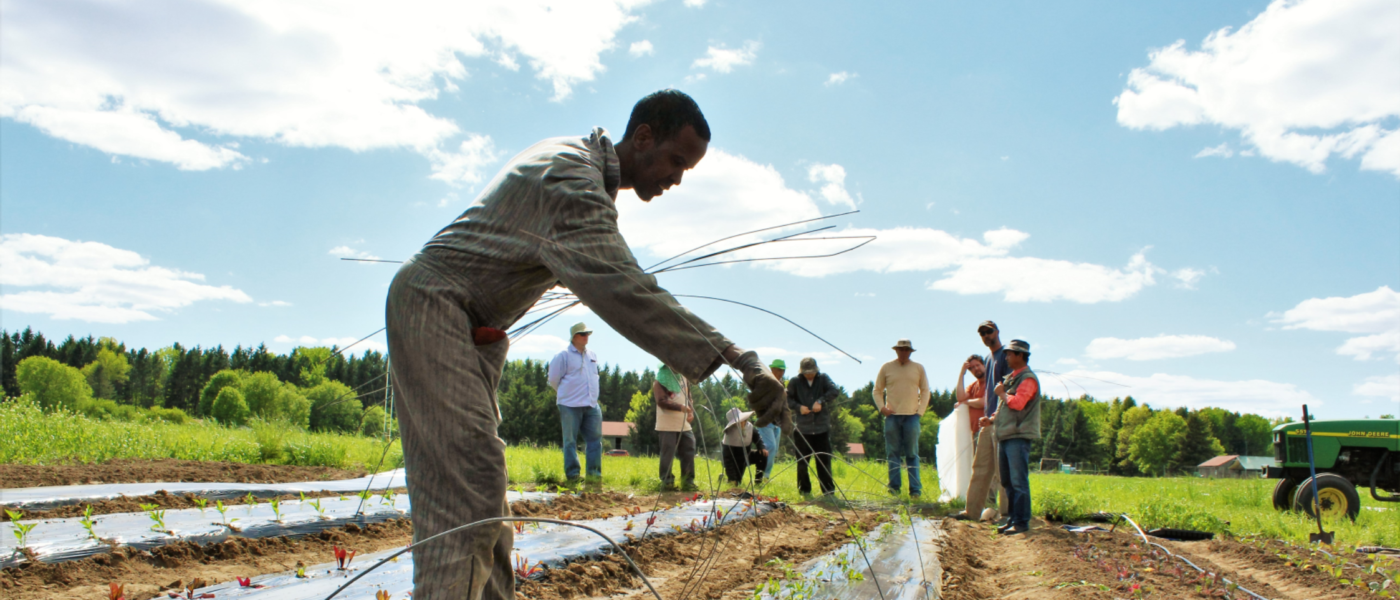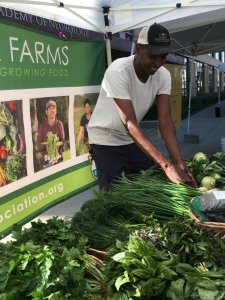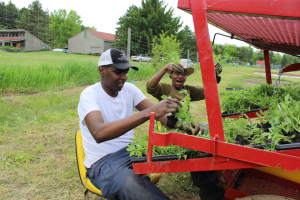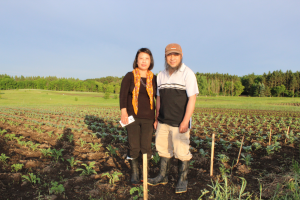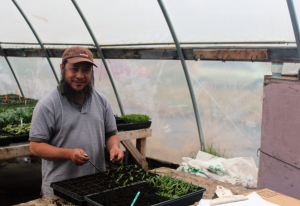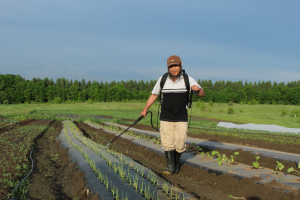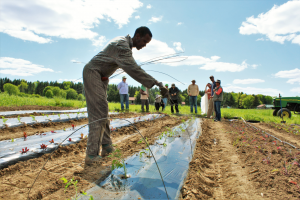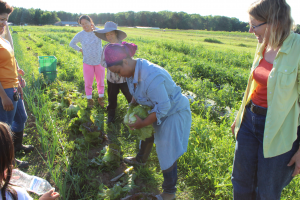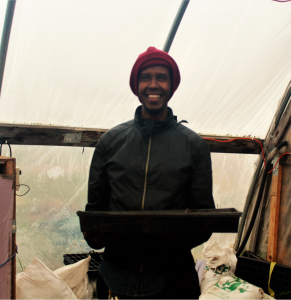We’re highlighting three stories from a grantee, the Minnesota Food Association, a program of The Food Group. For two decades, MFA has supported Minnesota farmers from historically underrepresented communities (immigrants, people of color, women, and veterans) in building sustainable farming businesses and fostering a more just and sustainable food system for all.
Farm Aid has a long and robust history of funding organizations that are doing inspiring work with immigrant and refugee farmers. We believe that our farms and communities benefit from having a diversity of farmers on the land. Many immigrant and refugee farmers have experience farming in their homelands, and bring valuable new methods, practices and crops to American agriculture and expand the repertoire of our foods and flavors. Immigrant and refugee farmers tend to farm using sustainable methods, on a small scale, to feed their families and their communities. As we look ahead to a major transition of farmland from one generation to the next, immigrant and refugee farmers are an important, and growing, part of the new farmer movement we need in this country.
Over 40 local beginning farmers, the majority of whom come from immigrant communities and communities of color, participate annually in MFA’s Farmer Education Program, learning the necessary skills to become organic farmers. At their certified organic incubator farm, Big River Farms, MFA provides education, training and technical assistance in sustainable farming, marketing, and business planning. The farm also acts as a local food hub, delivering a precious marketing outlet for small-scale local farmers. By giving immigrant farmers the resources they need, MFA is giving their local economy a boost, and encouraging the blossoming of a local food movement. We’re proud to feature the stories of three of their farmers:
Abdinasir:
Story by Sarah Beahan
Abdinasir wanted to be a farmer. He’d never farmed before; he didn’t even have a spot in the community garden. He appreciated farming and was intrigued by the idea of nourishing himself and his family with what he grew, but he didn’t have the foggiest idea of where to start.
So, he Googled it. He found a Somali farming right here in Minnesota. Even better, Abdi knew him. This acquaintance connected him to the MFA Farmer Training Program, where he is now a first-year farmer.
Abdi is unquestionably a busy fellow. He works full time at the family gas station, raises three children and just completed a carpenter training program. But he doesn’t complain. He has a remarkably easy-going, forward-looking attitude. He just does his best while he is able.
Besides, he sees this as a way to build the life he desires—one in which he owns his own farm, repairs his own buildings and equipment, and raises his own produce and livestock. The Farmer Training Program is perfect for a guy of Abdi’s ilk: a renaissance man of talents who desires independence and sustainability.
“[Before] I had no connection to food. But I want to have a relationship with what I eat. It’s a responsibility. I like that they teach us hands-on skills. We learn irrigation, bookkeeping, inventory, marketing, how to fix things. All these skills fit together.”
I met Abdi at the farm at noon on a hot June day during Ramadan, the Muslim holy month of fasting. In observance of the holy month, Abdi doesn’t eat or drink anything from sun-up to sun down. He shrugs this off. His crops still need weeding. The work doesn’t stop just because he is fasting.
“There are so many things that are out of your control. You can’t program the weather like you program your phone. It’s out of your hands. You just make every day the best day you can.”
Update: Abdinasir is entering his second year in MFA’s Farmer Education Program. This year he will be managing his own independent plot for the first time. He continues to build his skills and capacity as an organic farmer and is considering expanding into raising chickens this season.
The Early Birds:
Story written by Nancy Cook; photos by Laura Hedeen
Lue Lor was born in Laos to a family of modest means. His father was involved with American CIA operations, and his mother managed the family’s small farmstead. The years that followed US troop withdrawal from Viet Nam were a “long, sad story” for Lue. His mother and siblings were killed in the Viet Nam War, and in 1979 Lue, then ten years old, and his eleven-year-old brother escaped to Thailand with an uncle. Fifteen years later, married and father to three children, Lue arrived in the United States. It was difficult at the beginning, adjusting to harsh weather and a strange language. But now, Lue says, “Everything is good.” Since immigrating, the Lors have welcomed three more children into the family.
Lue has rediscovered his farming roots. Two years ago, he got connected to MFA’s training program through friends. He started with a quarter of an acre but quickly felt the desire to expand. A man with “a passion for the outdoors, the sun and the wind,” Lue has found his work at MFA to be very satisfying. His goals are to complete the training program at MFA and acquire his own farm, which will enable him “to give back” and contribute to community health, as well as feed his own family. Every day, in pursuit of his dream, he is “up before the sun,” Lue’s son Houa reports.
Lue has passed on to his children wisdom acquired during his life’s journey. Houa, the second born, and a college graduate with professional credentials, says that chief among the values he’s taken from his father are patience and diligence. Farming “takes a lot of work,” says Houa. The work is often invisible, and many consumers underestimate the labor involved. As the Lors note, most consumers don’t realize that planting begins in January, or that farmers work nights and weekends. Lue adds: “They survive heat, the dark, rain,” and they do it with “love, passion, care.”
Both father and son reflect positively on the value of farmers markets. The markets create opportunities for people to get to know each other and introduce people to other cultures. According to Lue, many “beautiful transactions” have taken place on market days. One example the Lors relate is of a time a customer invited them to dinner, where a “spaghetti” meal made from squash raised by Lue was served. It’s this kind of experience, they say, that illustrates what matters most: “family, community, health.”
Update: Lue, Kia, and their son Houa continue to farm at Big River Farms, and are entering their first year in MFA’s Whole Farm Management program. They are actively looking for farmland to purchase, and this year will be focusing on learning skills like driving the tractor, obtaining independent organic certification, and managing their own cover crop so that they are better prepared to take care of their own land once they find it.
Naima’s Farm:
Story written by Mike Rollin; photos by Lebo Moore & Laura Hedeen
When Fagas Salah first came to Big River Farms he told staff, “Sign me up, I’m born for this.” But it has been a winding path that brought Fagas here. He grew up in a city—Mogadishu, Somalia—and for the last nine years has worked as a long-haul truck driver. But with his children getting older and missing him on long trips, and with a growing interest in farming, Fagas decided it was time to make a change. “I saw a video of a man from Somalia that has his own farm now in Minnesota and wondered, ‘Wow, is this possible?’” That farmer connected Fagas to MFA, and he signed on for the next year’s program right away.
While his enthusiasm is boundless, Fagas is clear about the challenges of farming. “I thought truck driving was hard work until I did this. I have so much respect for farmers now.” He comes home (a 65 mile commute one-way) dead tired. When his wife asked if he was ready to quit, he remembers life on the road. “I was sitting 16 hours a day driving a truck. This is healthier—I want to be working with my hands.” His farm plot is the reward, the long rows are planted with a vibrant mix of tomato, bell pepper, onion, Swiss chard, cabbage and kale.
Working at the farm has become a family affair. During the winter, MFA offers classes for beginning farmers. When Fagas is out driving for the added income, his wife Naima Dhore attends in his place. His children also visit the farm when he is working. “They love to run in the open spaces here.”
Fagas is planning his future step by step. Next year, a quarter acre, the following year, A half acre. When he’s certified as an organic farmer, he’d like to buy his own farm. The training MFA provides has been invaluable. “They teach you record keeping. Every receipt, every seed packet. When I go for a loan, the bank needs a picture. I’m compiling a story that will tell them, ‘This guy is serious.’”
Longer term, Fagas is thinking of bringing his knowledge back to Somalia. “These skills I’m learning will be useful there too—crop rotation, water-saving techniques, interplanting. Desertification is terrible in Somalia now. I’d like to maybe build an institution there to teach better farming.”
Update: Fagas has turned most of the management of the farm over to his wife. Naima has since emerged as a leader in the Somali farming community in the Twin Cities and has shared her farming story with many local and international media outlets. She continues to pursue a master’s degree, raise two children, and farm a plot at Big River Farms.
